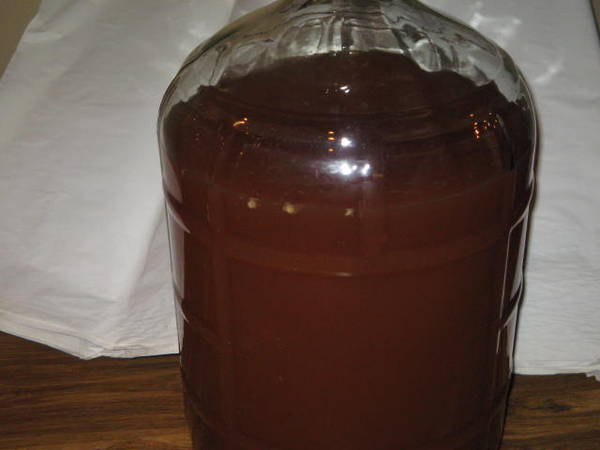SteveM
Well-Known Member
Raspberry Ale
--------------------------------------------------------------------------------
Recipe Type: Extract
Yeast: Nottingham Dry Ale
Yeast Starter: None
Additional Yeast or Yeast Starter: None
Batch Size (Gallons): 5
Original Gravity: Unknown
Final Gravity: Unknown
IBU: Unknown
Boiling Time (Minutes): 60
Color: Pale pink
Primary Fermentation (# of Days & Temp): 14 days, cool room temp
Additional Fermentation: 14 days, cool room temp
Secondary Fermentation (# of Days & Temp): 14 days, cool room temp
I've gotten in the habit of making a Raspberry Ale every fall for the holidays. This past year I used black raspberries but red are fine also. Red are much cheaper to buy off-season but they are about the same price when you buy them in season.
I use about 5 3/4 to six gallons of water to start. A lot gets left behind during racking because the product is so cruddy during brewing. This leaves you a decent amount to bottle by the time you are done. Since you really do have two stage fermentation (the fruit sugars will ferment in the second stage) this extra water does not seem to appreciably affect the strength of the beer. I always use spring water but use whatever you prefer.
In the primary, I used 3 lbs of Munton extra light DME and 3 lbs of Carlson dry rice solids. The brands are not important - but to get a nice pale base color that will show the raspberry color you need to use real pale extracts. Rice is about colorless and flavorless, which makes it well suited for this brew.
Therefore also no steeping grains. The lack of steeping grains will keep the color very light but it will also affect head retention. It will take longer for you to get a nice head that holds up a while, but that's OK because for this brew you really need to let it age. Opening one that is a week in the bottle will probably produce disappointment.
I use a light hop load for my raspberry ales (in contrast to most of my brews) because a lot of hoppiness can mask the raspberry flavor. For my last batch I used just 2 oz of Mount Hood 3.8%, half at 15 minutes and half at 45 minutes.
The specific hops chosen is much a matter of personal taste. I just made a red ale using Amarillo hops (along with Williamette) and I have a feeling that Amarillo's strong and fairly distinctive flavor might really complement the raspberries. Next fall, I will probably try this.
I normally use about 3 lbs of fresh raspberries for a five gallon batch. You can buy them fresh in late summer just about anywhere but I like produce stores. They usually have the best prices and the freshest inventory. Grocery stores are usually higher priced. I like fresh but frozen will also work, if you miss the season. I've used more but as I keep piling up those six ounce containers, little dollar signs start spinning in my head. If you are in a place where they grow raspberries they might be cheaper. Black ones will give a more distinctive color but the flavor is about the same either way.
I give the basic brew a week or two in the fermenter, then rack to a secondary and add my fruit. I pasteurize the fruit by putting it into a pot with enough water to cover the fruit and bringing it to about 160F for ten or fifteen minutes. Stir it to keep it from scorching. Then it all goes into the secondary. I use a sanitized wide mouthed funnel to pour this "fruit slurry" (even without boiling it will become semi-mush) into the secondary.
I tried to buy a suitable wide mouth funnel but was not satisfied with anything I found. The handiest one I have can be easily duplicated - I use the top of a two liter soda bottle.
Even with four pounds the raspberry flavor has never been overwhelming. Using real fruit results in a lot more evolution of the flavor over time. Extracts seem to be much more stable in taste but also seem to have an artificial feel in their taste - hard to describe but that's how it felt to me.
Anyway, after a week or two in the secondary, I siphon the carboy out into a third stage to allow it to clear (it will be very cruddy at the end of the second stage). I give it yet another week or two to settle and clear, then bottle.
I have this in fermenters for a total of about five or six weeks. I started my current batch in late September and bottled it in early November. It was acceptable by Thanksgiving but really was in it's prime by Christmas, and is still improving. It takes a good month or six weeks to really hit its stride but the results are great. The raspberry flavor is a presence but not the dominant taste, and the brew is nicely astringent.
One more point - using extracts (normally just dumped into the bottling bucket along with your priming sugar) does not give you any kind of unusual coloring in your beer. This is a drawback in my opinion but the process is much easier - I just do two weeks of primary, then bottle. If you use extracts, you would not use extra water (described above). You could use a second stage even with fruit extract if you like to do that - in my experience rice solids result in a "loose" trub and take longer to clear compared to what we are used to with barley malt.
I've used both extract and real fruit and in my opinion the extra work (and cost) in using real fruit is definitely worth it.
Good luck with this - let me know how it turns out.
--------------------------------------------------------------------------------
Recipe Type: Extract
Yeast: Nottingham Dry Ale
Yeast Starter: None
Additional Yeast or Yeast Starter: None
Batch Size (Gallons): 5
Original Gravity: Unknown
Final Gravity: Unknown
IBU: Unknown
Boiling Time (Minutes): 60
Color: Pale pink
Primary Fermentation (# of Days & Temp): 14 days, cool room temp
Additional Fermentation: 14 days, cool room temp
Secondary Fermentation (# of Days & Temp): 14 days, cool room temp
I've gotten in the habit of making a Raspberry Ale every fall for the holidays. This past year I used black raspberries but red are fine also. Red are much cheaper to buy off-season but they are about the same price when you buy them in season.
I use about 5 3/4 to six gallons of water to start. A lot gets left behind during racking because the product is so cruddy during brewing. This leaves you a decent amount to bottle by the time you are done. Since you really do have two stage fermentation (the fruit sugars will ferment in the second stage) this extra water does not seem to appreciably affect the strength of the beer. I always use spring water but use whatever you prefer.
In the primary, I used 3 lbs of Munton extra light DME and 3 lbs of Carlson dry rice solids. The brands are not important - but to get a nice pale base color that will show the raspberry color you need to use real pale extracts. Rice is about colorless and flavorless, which makes it well suited for this brew.
Therefore also no steeping grains. The lack of steeping grains will keep the color very light but it will also affect head retention. It will take longer for you to get a nice head that holds up a while, but that's OK because for this brew you really need to let it age. Opening one that is a week in the bottle will probably produce disappointment.
I use a light hop load for my raspberry ales (in contrast to most of my brews) because a lot of hoppiness can mask the raspberry flavor. For my last batch I used just 2 oz of Mount Hood 3.8%, half at 15 minutes and half at 45 minutes.
The specific hops chosen is much a matter of personal taste. I just made a red ale using Amarillo hops (along with Williamette) and I have a feeling that Amarillo's strong and fairly distinctive flavor might really complement the raspberries. Next fall, I will probably try this.
I normally use about 3 lbs of fresh raspberries for a five gallon batch. You can buy them fresh in late summer just about anywhere but I like produce stores. They usually have the best prices and the freshest inventory. Grocery stores are usually higher priced. I like fresh but frozen will also work, if you miss the season. I've used more but as I keep piling up those six ounce containers, little dollar signs start spinning in my head. If you are in a place where they grow raspberries they might be cheaper. Black ones will give a more distinctive color but the flavor is about the same either way.
I give the basic brew a week or two in the fermenter, then rack to a secondary and add my fruit. I pasteurize the fruit by putting it into a pot with enough water to cover the fruit and bringing it to about 160F for ten or fifteen minutes. Stir it to keep it from scorching. Then it all goes into the secondary. I use a sanitized wide mouthed funnel to pour this "fruit slurry" (even without boiling it will become semi-mush) into the secondary.
I tried to buy a suitable wide mouth funnel but was not satisfied with anything I found. The handiest one I have can be easily duplicated - I use the top of a two liter soda bottle.
Even with four pounds the raspberry flavor has never been overwhelming. Using real fruit results in a lot more evolution of the flavor over time. Extracts seem to be much more stable in taste but also seem to have an artificial feel in their taste - hard to describe but that's how it felt to me.
Anyway, after a week or two in the secondary, I siphon the carboy out into a third stage to allow it to clear (it will be very cruddy at the end of the second stage). I give it yet another week or two to settle and clear, then bottle.
I have this in fermenters for a total of about five or six weeks. I started my current batch in late September and bottled it in early November. It was acceptable by Thanksgiving but really was in it's prime by Christmas, and is still improving. It takes a good month or six weeks to really hit its stride but the results are great. The raspberry flavor is a presence but not the dominant taste, and the brew is nicely astringent.
One more point - using extracts (normally just dumped into the bottling bucket along with your priming sugar) does not give you any kind of unusual coloring in your beer. This is a drawback in my opinion but the process is much easier - I just do two weeks of primary, then bottle. If you use extracts, you would not use extra water (described above). You could use a second stage even with fruit extract if you like to do that - in my experience rice solids result in a "loose" trub and take longer to clear compared to what we are used to with barley malt.
I've used both extract and real fruit and in my opinion the extra work (and cost) in using real fruit is definitely worth it.
Good luck with this - let me know how it turns out.






